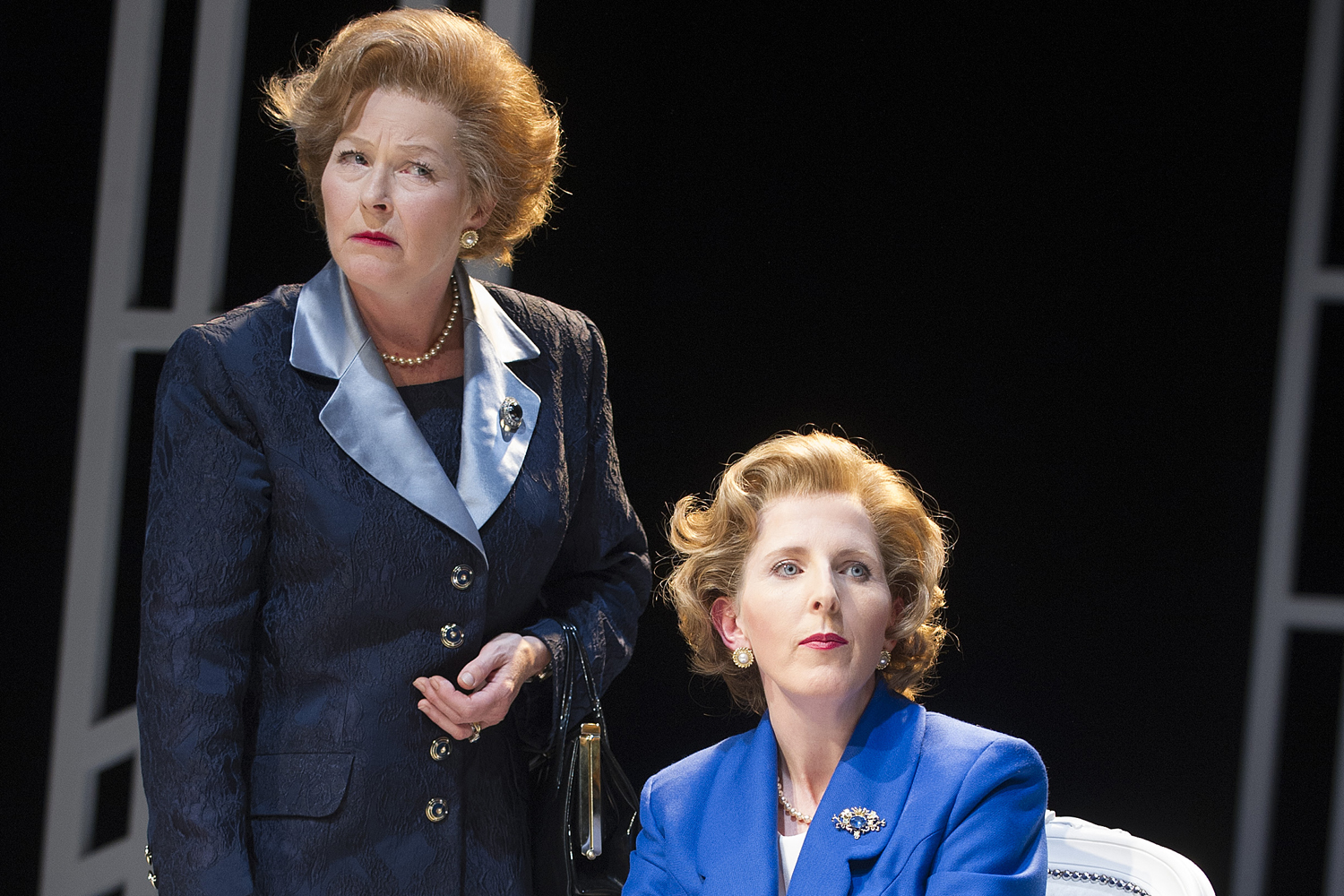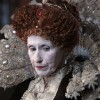Handbagged, Vaudeville Theatre
discussed for The Spectator, 12 April 2014

Why do the Left love the Queen? Sure, most of us agree she’s done an excellent job in a difficult role, only screwing up a few major life decisions: tricksy choice of husband, wintry education of her children, fastidious attitude to peanuts. But as one of the country’s richest women, a symbol of economic equality she ain’t. So it’s a mark of just how willfully hostile theatreland is to Margaret Thatcher that in Moira Buffini’s new play about the two, Handbagged, it’s the Queen, not the grocer’s daughter, who emerges as the courageous voice of social justice. It’s a frustrating blindspot in an otherwise witty, watchable production, anchored by consummate performances from Marion Bailey and Fenella Woolgar.
Buffini has a sinuous grasp of the problems and possibilities of staging history – in a canny move, Maggie and the Queen are each played by two actresses simultaneously, allowing each to question her own memory and motives in dialogue with herself rather than potentially interminable soliloquy. Four actresses on stage to play two women. The script describes this as dialogue between older and younger versions of each woman, but Buffini has actually pulled off something far more subtle: in naming the first pair: ‘Q’ and ‘T’ (Marion Bailey and Stella Gonet), all intimacies effaced, the playwright stages the familiar public incarnation of each icon, while as ‘Liz’ and ‘Mags’, Lucy Robinson and Fenella Woolar are left to surprise us with flashes of intimacy.
Thus Lucy Robinson’s ‘Liz’ giggles over the 1979 election: ‘Philip and I had put money on the result’, whereupon Marion Bailey’s more regal ‘Q’ instantly shuts her down: ‘No, we did not!’ It’s a smart ploy to allow the playwright to maintain continual deniability about her flights of fantasy – we’re constantly teased with spectacular blowouts between the two, only for the official version of events to reassert itself. And it’s an apt figuration for the way historical truth flirts with and evades the historian.
Fenella Woolgar is one of our great underrated actresses, and as ‘Mags’, she radiates charisma. But unlike Lucy Robinson’s textured ‘Liz’, she’s essentially a mimic, channeling Thatcher’s most grating, patronising smiles, and showing little in the way of human vulnerability or variety. Sure, Thatcher was rigidly convinced of her own righteousness at even the toughest of times, but did she really always seek to cajole, rather than persuade? When asked if she ever listens, Woolgar’s Thatcher replies, ‘when one knows one is right, that is very hard’. The press night audience howled with laughter. But while Maggie always had the courage of her convictions, even her enemies should acknowledge that it was only with a dose of Machiavellian adaptability that she got through the long selection battles before Finchley, and the junior ranks of government. The tin ear to social dynamics only developed after too many years in government.
Where Margaret Thatcher was unwavering was in her opposition to socialism, at home and abroad. And it’s in its mockery of this constancy that Handbagged truly reveals its prejudices. ‘What we have now’, intones Gonet’s Thatcher at the start of her rule, ‘is a failed socialist experiment’. Indeed – how else could one describe striking NHS workers picketing patients at their own hospitals in the Winter of Discontent? If Communism looks an absurd idea in the UK today, that’s because Margaret Thatcher won the battle of ideas. But for Buffini, this is just an excuse for the Queen to sigh about Thatcher’s tendency to lecture, and Gonet to prove her right by launching into a lengthy drone about freedom. (Although I did love Thatcher trying to get the Queen to read The Road to Serfdom).
Meanwhile the Queen bleats about rising world inequality in tricola she’s picked up from Indira Ghandi – little matter that, as Laurence Chandy and Geoffrey Gertz of the Brookings Institution recently demonstrated, half a billion people were lifted out of poverty between Margaret Thatcher’s rise to power and 2005, and thanks to the spread of global capitalism, the same number again have escaped in the decade since. Some moral victory for the opponents of world socialism.
But blinkered as it is, Handbagged is funny. And Indhu Rubasingham’s production, like so much of her work at The Tricycle theatre, is impeccably executed. Two put-upon males, Neet Mohan and Jeff Rawle, play all the hapless supporting-blokes deliciously between them: from Zambian President Kenneth Kaunda to Geoffrey Howe (I counted 17 quick changes, but it could be more). And Buffini shows she has at least a grasp of history in her focus on the Queen’s instinctive understanding of the Commonwealth – an early sequence about her efforts to nurture talks on the future of Zimbabwe is shrewd and enlightening.
Unlike The Audience, however, this isn’t a play about the monarchy. Buffini is more interested in the two women’s leadership – despite the recent juggernaut of The Audience, Handbagged has been in development since The Tricycle’s 2010 Women, Politics and Power season. But while theirs was certainly a stormy relationship, the Queen’s concerns about Thatcherism were, if anything, the instinctive conservatism of a High Tory confronted by a Whig radical, hardly the rebellion of a soft-left conscience. Buffini told Women’s Hour yesterday that she felt she’d achieved the impossible, ‘writing a fair play about Thatcher’. Given that she spent the days after Thatcher’s funeral, by her own admission, trying to explain to her children why reasonable people could disagree about celebrating the woman’s death, one shudders to imagine what her unfair version might have been like.






